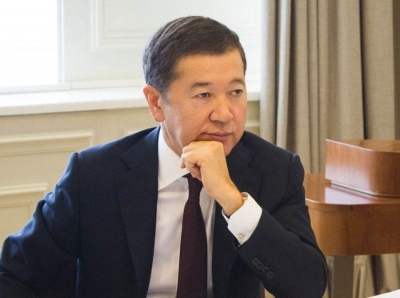Military coup in Niger: a new hotspot?
An elite army unit in Niger has deposed the country’s president Mohamed Bazoum. Their leader, General Omar Tchiani, has appointed himself the new ruler. Neighbouring Burkina Faso and Mali have warned against any interference by the West African community of states Ecowas and said that any military intervention would be seen as a "declaration of war". The media debate in particular the roles played by France and Russia.
Targeting the entire Sahel region
Tygodnik Powszechny sheds light on Russian involvement in the region:
“The desert state of Niger with its rich uranium deposits would be a real treat for the Russians. ... If the Kremlin succeeded in driving a wedge between Niger and the West and France and getting it on its side, Russia would become the de facto master of the entire Sahel. It would only need to bring about a change of power in Chad and replace military dictator Mahamat Déby, who is sympathetic to the West, with its own favourite. The Russians are already working on this. Wagner mercenaries are training Chadian rebels across the southern border in the Central African Republic, and across the northern border in Libya’s Cyrenaica.”
The West may end up on the losing side
The coup in Niger could become a geopolitical nightmare, fears De Standaard:
“On the global stage, Niger may seem insignificant, but there is a risk that the coup could have far-reaching consequences. If Russia solidifies its influence, it may impact its war against Ukraine. The West faces the risk of ending up on the losing side in various ways. It will lose geopolitical influence, need to seek alternative resource suppliers, and see its attempts to economically isolate Moscow as a military adversary being thwarted.”
Nightmarish exploitation
This is all about Africa’s resources, El Periódico de Catalunya argues:
“The colonisation by Europe was a ruthless subjugation, and decolonisation doesn’t align with the dreams of independence movements. ... Niger is a strategically important country due to the abundance of uranium in its soil. The coup leaders have detained President Mohamed Bazoum, who is likely the last openly pro-Western leader in the region. ... This is not a return to the Cold War era but a new struggle for control over Africa’s resources. Wild capitalism. And the African dream of liberation remains a nightmare.”
A bitter loss for the West
La Repubblica explains why the EU’s interests are affected:
“Niger is a central hub of the migration routes connecting West Africa with the Mediterranean. The permeability of the Libyan borders has made Niger an outpost of the EU’s (anti-)migration policy on the southern front — similar to Turkey in the east. Niger has also been able to present itself as a bulwark of democracy in a strategically important and contested region that straddles the Sahel, the Sahara and North Africa and has been rocked by a wave of military coups and authoritarian coups since 2020. ... The overthrow of liberal institutions has often led to a curtailment of the West’s influence in the past.”
People mistrust France
The Süddeutsche Zeitung explains why the West was unable to protect the democratic government:
“Firstly it has to do with the fact that Niger faces some truly fearsome adversaries: climate change, terrorism, the lack of prospects in a rapidly growing society for which there are already far too few jobs. But it’s also because for good reason many people in the region see the West — and France in particular — not as part of the solution but as part of the problem: as an ostensible helper in times of need that in reality wants above all to secure its grip on Niger’s uranium and keep refugees at bay. The fruits of this frustration could now be reaped by Moscow, just as was the case in Mali.”
Russia will benefit
Libération looks at who will suffer and who will benefit from the new situation:
“UN Secretary-General António Guterres has good reason to be ‘very concerned’. ... First and foremost regarding the local populations, because the main beneficiaries of this institutional instability are the Islamist terrorist groups that are rampant in the region. The events in Niamey are very bad news for France, of course, but also for the US, Niger’s preferred security partner until now. Russia, on the other hand, is no doubt glad to see Western influence undermined like this, although it cannot be assumed that Russia was directly behind this coup.”









